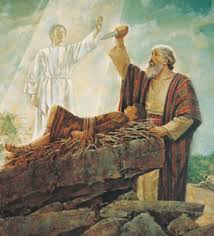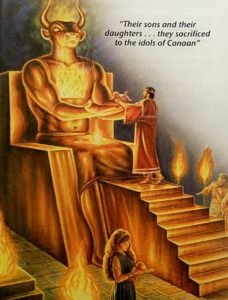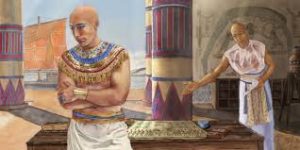Today we’re going to try and finish Hebrews 11. The last time I wrote, we covered the first half of Hebrews 11 from verses 1-16. The author was discussing the concept of faith. Faith is very important because it is by faith that we attain salvation. We are saved by faith. Paul writes in Ephesians 2:8-9 “For it is by grace you have been saved through faith. It is not from yourself or anything you’ve done, but the gift of God.”
Christians who believe the Bible will affirm that we’re saved by grace through faith, and we aren’t saved by works. This is all true and good, but when we say we’re saved by faith what does that mean? What exactly is faith? So let’s review the first half of Hebrews 11.
The Author of Hebrews defined faith as confidence in what we hope for and assurance about what we do not see. In order to have faith, one must not have certainty. We can only have faith in the things we do not see. We no longer hope for something if that thing has already happened. I am not hoping I get to church last Sunday, I was there; it happened. And I no longer have faith that I can arrive somewhere that I am. When you have confidence in something, or when you lack confidence in something, it affects your behavior. If I am confident it will rain, that leads to certain actions, like grabbing an umbrella, and leads to certain inactions, like not going outside for a run. If you look at someone’s behavior it’s a window to what they have faith or confidence in. In other words faith leads to action. The author gave a few examples of people in the old testament who had faith in something unseen and it led to an action (or an inaction). Noah’s faith led him to a type of inaction. He disengaged with the world around him, and stopped participating in all normal life. The norm was evil and selfishness and disobedience or Godlessness. His inaction also led to him hearing the warning of God, and he built an ark. These behaviors were faith based, because he was acting in a way that was contrary to what he saw, but consistent in the unseen things he was hoping for. Abraham had faith too. He went to an unseen place and lived like a stranger in a foreign land. He and his son and his grandson all lived in tents, assured in what they were hoping for. The author pointed out that even though they lived lives of faith, none of them received what they had been promised, at least not while they lived on this earth. God’s promises are always kept but are fulfilled on a longer time horizon, and often times that time horizon is long enough to extend beyond the lifetime of the person who received the promise. So let’s start today’s verses
17 By faith Abraham, when God tested him, offered Isaac as a sacrifice. He who had embraced the promises was about to sacrifice his one and only son, 18 even though God had said to him, “It is through Isaac that your offspring will be reckoned.”[c]
The author had mentioned Abraham before, but now he returns to Abraham as an example, and he highlights the event where Abraham offered Isaac to God. This act of faith deserved its own section because it was a drastically different type of faith. Abraham had been given a promise that Isaac would play a pivotal role in the reckoning of Abraham’s offspring. What does that mean? The reckoning? Some translations say the calling or the naming of the offspring. It means that God had promised Abraham to father a great nation, with numerous descendants, and all nations would be blessed through his offspring. More specifically, that great nation and the offspring would all come from the line of Isaac. Isaac was the key to the puzzle. Got it? His descendants will be established through Isaac. Now, it’s tough to imagine God asking for us to sacrifice one of our kids, let alone an only son. It’s hard to believe that a Good God would make a requirement like that of any father. If he did, I am sure we would question His goodness. People who dislike God or don’t believe use this example as a reason to call God evil and deny His existence. It seems against God’s character, right? Well, by studying the Bible, we have a look into God’s character. In fact in the book of Leviticus (chapter 20:2-5) God said in his law that child sacrifice was an abomination and deserved death. In Deuteronomy 12:30-31 God said “be careful not to be ensnared by inquiring about their gods, saying, “How do these nations serve their gods? We will do the same.” 31 You must not worship the Lord your God in their way, because in worshiping their gods, they do all kinds of detestable things the Lord hates. They even burn their sons and daughters in the fire as sacrifices to their gods.”
This text from Deuteronomy makes it clear that God finds offering children detestable. Detestable! He beyond hates the idea of child sacrifice. God says children are a blessing. For us, we know how the story of Abraham and Isaac ended. God, in his sovereign omniscience, also knew how the story would end. God didn’t want Isaac dead, and God didn’t want Abraham to murder his son. That was never Gods goal. But God wanted Abraham to fathom a world without his son. To truly imagine and feel that loss, and in Abraham’s heart to believe and trust that God was still Good and Worthy of praise. Rabbis have pointed out that when God’s Angel interrupted Abraham’s act, that basically was God condemning practice of child sacrifice. In our eyes today, sacrificing children to gods is barbaric and should never have existed, but at that time, it was sadly a common occurrence among religions. God set his people apart by ending that practice. When we think about Abraham’s sacrifice, and giving an only begotten Son it further points us towards the gift that God gave when he sent Jesus to be our redeemer.
19 Abraham reasoned that God could even raise the dead, and so in a manner of speaking he did receive Isaac back from death.
It isn’t often that we get a sneak peek inside someone else’s mind and the reasoning and logic that is making the decisions happen. But the Bible tells us that Abraham believed that if God said that the offspring was going to come from Isaac, and Abraham sacrificed Isaac, it was more likely that God would raise Isaac from the dead than to break a promise to father a nation. When God commanded Abraham to sacrifice Isaac, Isaac was as good as dead. Then God made a way for Isaac to live, and Isaac was brought from death to life. Similarly, God gave his only begotten son to die for our sins. Jesus Christ was dead. But he was brought back to life from death. When approached this way, the story of Abraham and Isaac points not just to an ultimate sacrifice made to reconcile a fallen people, but it also points to resurrection and the dead being brought back to life. Its a profound example, but we will continue on.
20 By faith Isaac blessed Jacob and Esau in regard to their future.
21 By faith Jacob, when he was dying, blessed each of Joseph’s sons, and worshiped as he leaned on the top of his staff.
22 By faith Joseph, when his end was near, spoke about the exodus of the Israelites from Egypt and gave instructions concerning the burial of his bones.
For these next three, the action that came from faith isn’t all that remarkable, especially compared to what Abraham had done, but there is a theme. An old man looks forward to a future that he will not live to see. He blesses a younger generation and gives instructions for how to continue. Being a charitable and forward thinking person when you know your days are numbered takes faith. You need assurance that the things you are hoping for will actually come to pass. You know the end is near, and the time that God gave you to spend here on this Earth is running out. You look back to the past to your best days, and then you look forward to an uncertain future. Your body is wearing down, you don’t heal or recover as quickly as you used to. You may experience general pain or discomfort that you never experienced in your youth. When time takes its toll, there’s temptation to be grumpy, regretful, callous, or defeatist. But look at these three examples. Isaac Joseph and Jacob all looked to the unseen, and raised their hearts to the heavens and worshipped. They also looked to the earth and blessed the next generation and gave instructions for how to continue on. This isn’t just a message for adults, the youth also heeded the advice and valued the blessings that came from the parents generation. Jacob yearned for the birthright and blessing, but Esau didn’t have time for his father’s silly religion and silly notions of descendants and a nation. Jacob thought beyond the here and now and shared faith in the unseen, while Esau hunted for his next meal, and shortsightedly said a birthright is no good if I starve to death.
23 By faith Moses’ parents hid him for three months after he was born, because they saw he was no ordinary child, and they were not afraid of the king’s edict.
Like Isaac, Jacob, and Joseph, Moses’ parents also valued the unseen future and the youth. They ignored the king’s edict and hid their son. They saved his life. Because of the faith of Moses’ parents, he was allowed to live and carry out God’s purpose for him, which affected the entire nation of Israel.
24 By faith Moses, when he had grown up, refused to be known as the son of Pharaoh’s daughter. 25 He chose to be mistreated along with the people of God rather than to enjoy the fleeting pleasures of sin.
Moses had confidence of something he hoped for and believed in something he couldn’t see. His faith in something greater caused him to be unsatisfied in the royal household of the Pharoah. Think about that! Moses had every and anything that this world could offer to someone at that time in history. He was basically adopted into the family of the King of Egypt, but his Faith allowed him to see he preferred being adopted into not into the family of Pharoah, but the family of God. Not being a royal noble with the King of Egypt but the King of Kings! When we settle for good things on Earth, sometimes it draws our eyes and attention away from the greater things from Heaven. Verse 25 said he chose to be mistreated along with God’s people instead of enjoying fleeting pleasures of sin. It’s good to mention that the pleasure we experience on earth is fleeting. It’s temporary. Is it sinful to live a life of comfort? It is sinful to have your life revolve around making sure you are comfortable. Comfort can become an idol for us. It is also sinful to ignore the pain and suffering of your fellow people, especially if it’s apparent that their hard work, which was forced and not voluntary, was the thing that is helping you to achieve your comfort.
26 He regarded disgrace for the sake of Christ as of greater value than the treasures of Egypt, because he was looking ahead to his reward. 27 By faith he left Egypt, not fearing the king’s anger; he persevered because he saw him who is invisible. 28 By faith he kept the Passover and the application of blood, so that the destroyer of the firstborn would not touch the firstborn of Israel.
It took a lot of faith for Moses to see an unseen future. He could look and see Hebrews as slaves, but God said he would set them free. He looked forward to a future where Hebrews would be God’s people, and God would be their God. He knew how stubborn and disobedient the Hebrew people could be, so being free from the Egyptians was a first step, but they would also need to be saved from their Sin. Moses was protecting his people for a future where God would save them not just from slavery to Egyptians, but Slavery to their own sins. Verse 26 even alludes to the fact that Moses was disgraced for the sake of Christ. He may not have known Jesus by name, but he knew that the king of Egypt was no comparison to the King who is God. He may not have known that Jesus was going to be the Lamb who took away the sins of the world, but he did trust God’s instruction that a lamb had to die, and lambs’ blood would protect the people from the wrath of God. He played the role and fulfilled the purpose that God had ordained for him. The Exodus that God chose Moses and Aaron to lead was a precursor and a shadow of a greater emancipation, found in Jesus Christ alone. when God’s people would be free from their Sins. If Moses was disgraced for the exodus, he was also Disgraced for the sake of Christ
29 By faith the people passed through the Red Sea as on dry land; but when the Egyptians tried to do so, they were drowned.
There are a few examples of how God helps us fight our battles when we have faith. The people were cornered with an army on one side, and the sea on the other. It took a great amount of faith to believe that this would turn out ok, and many of the people in the group didn’t have strong confidence that they had done the right thing, leaving with Moses. But when Moses raised his staff and stretched out his hand over the sea, the winds shifted and God brought the Israelites to safety on dry land. This miracle ended after the israelites passed, and the Egyptians who tried to cross were stuck in mud and drowned when the water came back. This example shows us that the same action done with and without faith has different results. Einstein said that insanity is doing the same thing and expecting a different result. I agree mostly, but the Israelites were able to successfully cross while the Egyptians weren’t. The same action had different results, the only difference was one group acted by faith and the other acted without faith. If you think about this example, even then the salvation of the Israelites was based on faith, and not works, since the Egyptians did the same works the Israelites did. You see a similar miracle when Peter walked on water towards Jesus. He didn’t change his stride or walk; he didn’t gain 20 pounds while walking. The action was the same, but his level of faith decreased, and his fear and doubt increased, and he began to sink in the water. What did Jesus say? You of little faith, why did you doubt?
30 By faith the walls of Jericho fell, after the army had marched around them for seven days.
Verse 30 gives Another miraculous example of God’s intervention was when the Isrealite army marched around the walls of Jericho for seven days. I particularly like the way the author described the “battle” (if you can call it that), since most of the times he said, by faith this person did that. But in this case the author just wrote, by faith, the walls fell. He couldn’t even admit that their marching around for seven days had anything to do with the walls falling. It was a miracle attributed entirely to God. Anyone who has marched for an hour or even an entire day knows that a long march makes you more tired, and my guess is more tired means less prepared to fight. After Seven days of marching in circles around the city, the Isrealite army must have been exhausted without even beginning the battle. I read an army could march 10-15 miles per day in decent conditions, which means they could have traveled 70-100 miles, but instead marched around a city.. The walls fell, and there is no explanation that gives any credit to the army’s action, just an acknowledgement that they fell after this other thing happened, a 7 day march.
31 By faith the prostitute Rahab, because she welcomed the spies, was not killed with those who were disobedient.
In verse 31, we read about Rahab’s faith. Her faith didn’t sound at all like a blind faith, or a faith without reason. She was very reasonable and thoughtful when dealing with God and the Israelites. When the spies found her, she basically spilled the beans. She said that she knew the Lord gave them the land. The people were terrified; everyone who lives in the country is melting in fear because of the Israelites. They heard about the parting of the Red Sea and the military’s subsequent victories city after city. Rahab then said it’s clear the Lord is in Heaven above and Earth Below, and is on the side of the Israelites. Nobody told her to have faith, she had evidence which gave her confidence. She was confident she was on the losing side, and that confidence led her to started negotiating for the protection of her family. She can protect the spies if the spies swear they’ll protect Her and her family. She wanted to be safe and believe them, but kept asking for a sure sign and a sworn agreement. The spies later gave her a scarlet cord to hang from her window, and there were strict orders to protect anyone in that house with the scarlet cord. They couldn’t guarantee anybody else’s protection. None of this seems like faith as we define it. Rahab believed the Israelites were dangerous, their God was real and was to be feared. She asked for promise after promise, there were terms of the agreement, just like a contract, there was a scarlet cord. If anyone in the house with the scarlet cord died, it was the spies’ responsibility. This agreement seemed like a business deal or contract with all sorts of terms and guarantees. Assurances were made for various parties safety. The truth of the matter is we can have confidence in what we don’t see and assurance in what we hope for, which means we can have faith, and still demand all sorts of additional promises and oaths, like Rahab. She was shrewd and took nothing for granted, but she still had that trust and faith that the Israelite army was going to triumph, and it was all because the Lord God was on their side.
32 And what more shall I say? I do not have time to tell about Gideon, Barak, Samson and Jephthah, about David and Samuel and the prophets, 33 who through faith conquered kingdoms, administered justice, and gained what was promised; who shut the mouths of lions, 34 quenched the fury of the flames, and escaped the edge of the sword; whose weakness was turned to strength; and who became powerful in battle and routed foreign armies. 35 Women received back their dead, raised to life again.
Verse 32 kind of gets to a point that I get to when I write. I’ve spent so much time on one or two examples or people, and realize that there’s so much more I want to say, and there’s so much more that can be said. Basically the entire Old Testament has more examples of people who were confident in an unseen future, and assured in something they were hoping for. God blessed people time and time again, and since God is unseen, we need to have faith to believe he exists and have faith to please him. In Christ, with God, all things are possible for those who believe and are called according to His purpose. This is why we go to Bible Study and read on our own, so we can understand who God is and what he has done throughout history. We aren’t just reading for the sake of doing work, we are learning about History and how God has interacted with a fallen people, and what his plans are to forgive and reconcile us to Him. This list is a bunch of examples of how believers can triumph against all odds. Each of the Judges is worthy of at least their own sermon, and probably even more than that. These people conquered kingdoms, administered justice, and gained what was promised. Sometimes we are fortunate enough get a chance to see God’s blessings and promises unfold here on earth.
There were others who were tortured, refusing to be released so that they might gain an even better resurrection. 36 Some faced jeers and flogging, and even chains and imprisonment. 37 They were put to death by stoning;[e] they were sawed in two; they were killed by the sword. They went about in sheepskins and goatskins, destitute, persecuted and mistreated— 38 the world was not worthy of them. They wandered in deserts and mountains, living in caves and in holes in the ground.
This next list is important too. Because we can’t honestly say that everything will come up rosy and perfect. When we are confident in the things that are unseen, we will often times make decisions and have actions that make little to no sense to anyone on this earth. When we live in such a way that our behavior and actions honor God, sometimes that really bothers people who don’t share that same faith. Sometimes our love for God and our relationship to our savior is envied and causes anger in others. Remember the story of Cain and Abel. Recall Abel’s close loving relationship to God, the submissiveness and humility that came from his offering. That relationship was seen and aroused Cain’s jealousy. Which ultimately led to Abel’s martyrdom. Persecution happens all too often, and we must remember that it’s not personal towards us, it’s directed against the God we love, and the savior who died for our sins. Another thing to be gracious about is that we don’t face the same persecution that people in that time did. Look at this list, flogging, imprisonment, death by sword, being sawed in two, stoning. Those were the ones who didn’t make it; and the ones that did had nothing, wandering homeless through deserts and mountains and lived in caves and holes. We complain if we are treated with the slightest disrespect, or are spoken to in a condescending manner. We tend to demand justice and fairness quickly, while the people mentioned by the author are patient and long-suffering. The author’s conclusion? The world was not worthy of them. The people who were mistreated were so special and extraordinary that they didn’t even belong to the same class of people who were part of the world. The world is not worthy of their presence, their light, their faithful acts of obedience to God. Let’s try and be a people who stand out in this world. Those who are on the side of a conqueror, whether or not we win or lose here on this earth, we can do it in such a way that it brings glory to God.
39 These were all commended for their faith, yet none of them received what had been promised, 40 since God had planned something better for us so that only together with us would they be made perfect
Remember nobody received the fullness of what they were promised in their lifetimes. There are so many churches that promise a better life, health, wealth, and prosperity. I fully believe that if you follow God’s commandments, things will generally go better for you, but that doesn’t come with a guarantee that troubles won’t arise. Jesus said when you followed him, you would have to pick up a cross. And persecution is almost expected. Jesus never promised comfort or material success. He promised something even greater. Adoption into God’s family. He promised forgiveness of sins. He promised an eternity with God the Father, the creator of everything. An eternity in the presence of God, who is the very essense of Love and Light, in him there is no darkness at all. Jesus made promises, but they were so long term that nobody here could ever expect to see the promises in this lifetime. God’s plan for us is something better than what we can see now. And the reason that Abraham could never receive what he had been promised is because Abraham’s promise includes us! Verse 40. God planned something better for US, so that only together with US would everything reach completion and perfection. We are part of the nations that Abraham was promised. The people who were sawed in two and stoned and killed by the sword, they did those things so that when they entered into God’s eternal presence, you and I could enter that presence too! That is very humbling. There were people who were martyred and tortured so that the Church of Jesus Christ would survive. People endured hardship so Jesus’s bride, his church would not die out from the oppression of a government or ruling despot. People suffered greatly so the church could exist and grow into what it is today. Think of that the next time you don’t feel like coming to a bible study or sitting down for a time of prayer. It’s a privilege to be part of God’s promises. God’s promise to Abraham could never be given to Abraham, because it includes you and me, as well as each and every church of Christ throughout the ages, from the time of Peter and Paul to the present day. Those of us with foresight will in faith look to a future that is still unseen to us. We must understand we can never fully receive any promise while the youth today still are growing and bearing fruit and making mistakes and learning. Our promises can’t be fulfilled the next generation has had their turns to play their part in God’s Kingdom. For now we just teach them and pray for them. As we get older we try to be like Jacob, who worshipped while hanging on to his cane. Jacob, who blessed the children and told them what amazing things God has done. We are in this together, and it will continue far beyond we can possibly imagine.













One thought on “Hebrews 11:17-40”